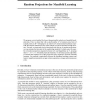Free Online Productivity Tools
i2Speak
i2Symbol
i2OCR
iTex2Img
iWeb2Print
iWeb2Shot
i2Type
iPdf2Split
iPdf2Merge
i2Bopomofo
i2Arabic
i2Style
i2Image
i2PDF
iLatex2Rtf
Sci2ools
NIPS
2007
2007
Random Projections for Manifold Learning
We propose a novel method for linear dimensionality reduction of manifold modeled data. First, we show that with a small number M of random projections of sample points in RN belonging to an unknown K-dimensional Euclidean manifold, the intrinsic dimension (ID) of the sample set can be estimated to high accuracy. Second, we rigorously prove that using only this set of random projections, we can estimate the structure of the underlying manifold. In both cases, the number of random projections required is linear in K and logarithmic in N, meaning that K < M ≪ N. To handle practical situations, we develop a greedy algorithm to estimate the smallest size of the projection space required to perform manifold learning. Our method is particularly relevant in distributed sensing systems and leads to significant potential savings in data acquisition, storage and transmission costs.
Information Technology | Linear Dimensionality Reduction | Manifold Modeled Data | NIPS 2007 | Random Projections |
Related Content
| Added | 30 Oct 2010 |
| Updated | 30 Oct 2010 |
| Type | Conference |
| Year | 2007 |
| Where | NIPS |
| Authors | Chinmay Hegde, Michael B. Wakin, Richard G. Baraniuk |
Comments (0)

